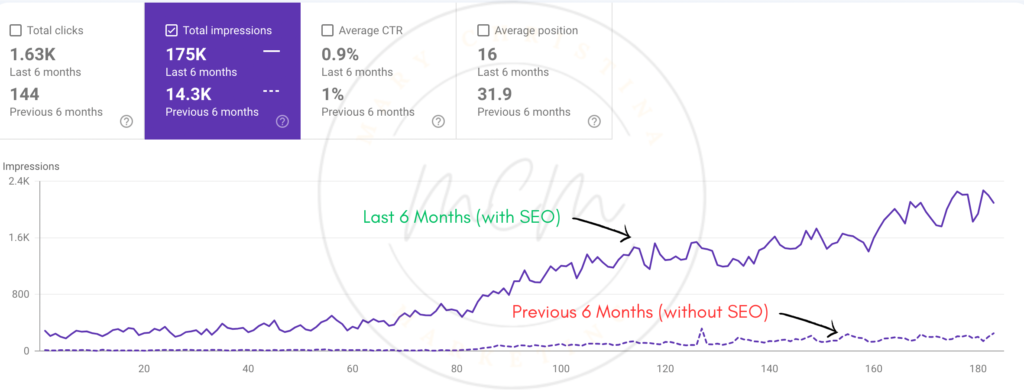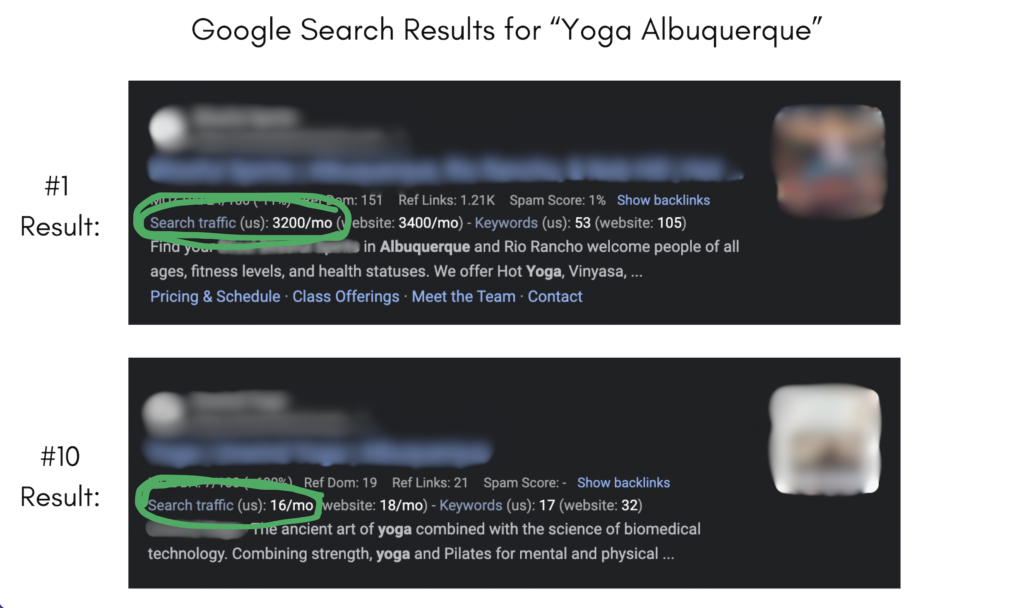As a small business owner in today’s digital age, having an online presence is crucial for reaching new customers and growing your business. However, simply having a website and social media accounts is not enough – you need to make sure that your site is visible and easily discoverable by potential customers who are searching for the products or services you offer. This is where Search Engine Optimization (SEO) comes into play.
SEO is the practice of optimizing your website and its content to rank higher in search engine results pages (SERPs) for relevant keywords and phrases. In other words, it’s how we make sure that your site actually comes up when people Google phrases related to your business. If you’re a bakery, you want to be sure that someone in your city Googling “best muffins” or “french pastries near me” will come across your business in the search results. When done correctly, effective SEO can drive more qualified traffic to your website, ultimately leading to increased sales and revenue for your business.
In this article, we’ll break down what SEO is, why it’s important for small businesses, and provide some practical tips to help you get started with SEO and reap its benefits.

Understanding SEO: The Basics
At its core, SEO is about making your website more attractive and relevant to search engines like Google, Bing, Yahoo, or YouTube.
Search engines use complex algorithms to crawl and index web pages, and they prioritize and rank websites based on various factors, including content quality, relevance, user experience, and authority.
In theory, organic search results will prioritize sites that have been around the longest, shared the most times, and proven the most helpful. In reality, SEO specialists have learned how to crack the code on the algorithm to nudge businesses higher up in the search results than their competitors. A quick Google search of any service in your city will show you which businesses in that industry have the most effective SEO strategy.
The higher your website ranks in search results for relevant keywords and phrases, the more likely people are to find and visit your site. This increased visibility can translate into more potential customers discovering your business, leading to increased brand awareness, traffic, leads, and sales.
Why SEO Matters for Small Businesses
As a small business owner, you might be wondering why SEO is so important. Of all the ways you’ve heard of to market online, is SEO really worth it?
Take.a look at this example. These are the 1st and 10th Google search results for the search query “Yoga Albuquerque”. You can see that the businesses ranking 1st on Google receives about 3200 visitors to their page per month. Meanwhile, the business in the 10th spot, is only receiving about 16 visitors per month.

If this example of the top search result receiving 200x more search traffic than the business in the 10th spot is not enough to convince you that SEO matter, here are a few key reasons why investing in quality SEO can be a game-changer for your business:
1. Increased Online Visibility
With so many businesses vying for attention online, it’s crucial to stand out from the crowd. Effective SEO can help your website rank higher in search results, making it more visible to potential customers who are searching for products or services like yours. Did you know that less than 1% of people click on the second page of Google’s search results? Someone’s business will be the top search result on Google when potential customers need the service you provide – will it be yours?
2. Improved Customer Engagement
By optimizing your website for relevant keywords and providing high-quality, valuable content, you can improve user engagement and encourage visitors to spend more time on your site. The longer people the spend on your site, the more likely they are to get to know your brand, fall in love with it, and buy what you’re offering.
4. Long-Term Results
Marketing strategies like banner ads, pay-per-click, social media marketing, etc. can be great solutions for driving traffic in the short term, but these methods don’t create lasting results. As soon as the ad expires or the social media post gets lost in the deluge of new information, your traffic will dry up. On-page SEO leads to a long-term boost in your company’s reputation and online visibility. Your organic results will benefit for years to come thanks to good SEO.
3. Better Return on Investment (ROI)
SEO is a long-term investment that can yield substantial returns over time. As your website ranks higher and attracts more qualified traffic, you’re likely to see an increase in leads, sales, and revenue, making your SEO efforts well worth the investment. Unlike ads, which are seen in direct proportion to how much you pay, SEO content can bring in traffic forever and you only pay for it’s creation one time.
Getting Started with SEO
Now that you understand the importance of SEO for your small business, let’s dive into some practical tips to help you get started. For the best results possible, we highly recommend you let an expert help you. While SEO may look simple from the outside, it’s a dynamic and complex science that takes a long time to master. With that being said, here are some of the major areas that an SEO expert will focus on to begin driving traffic to your business.
1. Keyword Research
The foundation of any successful SEO strategy is keyword research. You need to identify the keywords and phrases that your target audience is using to search for products or services like yours. Your SEO advisors will use tools to discover relevant keywords, analyze their search volume, and assess competition levels. They’ll use this information to plan content around long-tail keywords that your competition isn’t targeting.
2. On-Page Optimization
Once we’ve identified your target keywords, the next step is to optimize your website’s pages for those keywords. This includes optimizing page titles, meta descriptions, headings, content, internal links, and image alt text. We’ll use specific keywords strategically to ensure that your content is high-quality, informative, and engaging. No one wants to read content that was made for Google’s crawling bots instead of for human beings!
3. Local SEO
If your business serves a specific geographic area, local SEO is crucial. We will optimize your website with your business name, address, logo, website, and phone number consistently across all pages. Targeting specific local keywords, connecting with other local businesses, and encouraging customer reviews are also important for boosting local SEO.
4. Mobile Optimization
These days, most people are using their phones for, well, pretty much everything. It’s imperative to ensure that your website is mobile-friendly so that you’re not losing the potential traffic coming from mobile devices. Google prioritizes mobile-optimized sites in its rankings, so we will make sure your website is responsive and offers a seamless user experience across all devices.
5. Technical SEO
Technical SEO involves optimizing your website’s backend for search engines. This includes factors like site structure, page speed, title tags, site maps, crawlability, and indexability. We will ensure that your website loads quickly has a clean and logical structure, and is easily crawlable by search engine bots. While it may sound boring, this technical optimization is what separates the #1 Google Search Result from the #20 Google Search Result on page 2 that never gets seen.
6. Content Marketing
High-quality content targeting relevant keywords is crucial for SEO success. We will consistently create and publish informative blog posts and other types of content that can help you establish authority in your industry, attract backlinks (links from other websites pointing to yours), and ultimately improve your search rankings. Your website’s visibility and organic traffic is almost directly proportional to the amount of helpful, quality, and relevant content it produces.
7. Link Building
Backlinks are seen as votes of confidence by search engines and can significantly impact your website’s authority and rankings. While we will. mainly focus on creating high-quality content that naturally attracts links, we’ll also explore strategies like press releases, guest blogging, broken link building, relationship-building, and resource page link building to earn valuable backlinks from reputable sources.
8. Analytics and Tracking
To measure the success of your SEO efforts and make data-driven decisions, it’s essential to set up analytics tracking. Tools like Google Analytics can provide valuable insights into your website’s traffic sources, user behavior, and conversion rates, helping you identify areas for improvement and fine-tune your SEO strategy.
Embracing SEO for Long-Term Success
SEO works. Yes, it takes time, effort, and consistency, but the rewards are unmatched. By improving your online visibility, attracting more qualified traffic, and enhancing user engagement, SEO can help you stay competitive, boost sales, and achieve long term growth.
Just remember that SEO is an ongoing process, and as search engine algorithms and user behavior evolve, our strategies will need to adapt accordingly. We stay up-to-date with the latest SEO trends, tools, and best practices so that you can focus on your business and leave the digital marketing to us.

